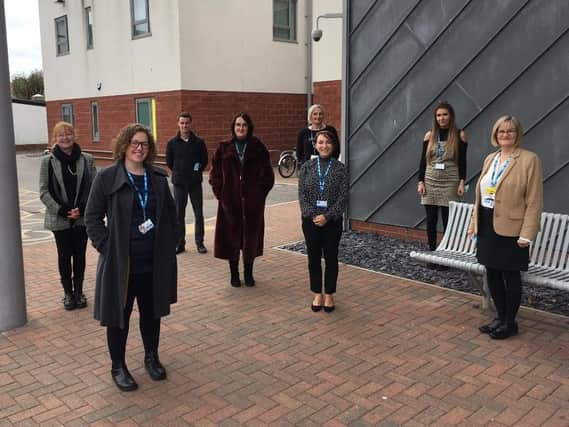'Get help early' people urged as resort mental health services notes surprise DROP in referrals during pandemic


As a result, waiting times for an assessment has "significantly" dropped to one to two weeks, while courses of low intensity cognitive behavioural therapy (CBT), a type of treatment, can now be accessed within three weeks, Supporting Minds Blackpool said.
Last month, The Gazette revealed how waiting times for a "welcome call" stood at two to four weeks, while some people were waiting three to seven weeks for one-to-one counselling.Manager Lynn Christie said: "We want to encourage people to seek help early."
Advertisement
Hide AdAdvertisement
Hide AdThe service, run by the NHS trust in charge of Blackpool Victoria Hospital and Clifton Hospital in St Annes, accepts self-referrals for a range of conditions, including stress, anxiety, and depression, which were described as "normal reactions to the daily challenges" currently being faced.
Lynn said: "We are doing our utmost to ensure we continue to provide therapy in these challenging times."
Most therapies are being provided over video call, by telephone, or online, with "people only attending face-to-face [meetings] where absolutely necessary".
Paul Farmer, the boss of the mental health charity Mind, said the upcoming second national lockdown, which will initially last a month when it gets underway on Thursday, could be the "greatest test of our mental health this year, not just for the public but also for the healthcare heroes who are "working tirelessly but may be struggling with their mental health too".
Advertisement
Hide AdAdvertisement
Hide AdBoth Mind and Carers UK said the Government has to learn from mistakes in the first wave and make sure people can get help early on.
Mind also urged ministers to support those who feel alone through the second lockdown, with Mr Farmer saying there is an "urgent need" for a winter mental health support package including in-person and online services.
And Caroline Abrahams, Age UK’s charity chief, said as many as one in three older people were already struggling with anxiety and depression plus loneliness, and now face a further challenge.
She added: “Older people are typically extremely resilient, but this second period of prolonged disruption to daily life and enforced isolation will hit some very hard."
Advertisement
Hide AdAdvertisement
Hide AdThe alcohol education charity Drinkaware's annual report in to the UK's drinking behaviour found job insecurity, poor mental health, a lack of daily structure, and more free time contributed to 26 per cent of people boozing more during the first lockdown.
Boss Elaine Hindal said: "Our monitor shows that when people are feeling fragile, whether they’re uncertain about their futures or struggling with working at home, they could be reaching for a drink.
“And while some people adapt, many might not be getting to grips with the so-called ‘new normal’, continuing to drink more than they usually would.
“Drinking can cause mental health conditions or make them worse, negatively affect your sleep, lead to weight gain, and has the potential to impair your immune function.
Advertisement
Hide AdAdvertisement
Hide Ad“It can also have many other serious long-term mental and physical health consequences.”
Rethink Mental Illness, a national charity, said it had noted a "worrying" surge in people seeking advice for self-harm and how to support someone experiencing suicidal thoughts.
It warned of a looming crisis as it urged people to seek support if they are struggling, as it revealed demand for advice and information doubled in the six months after lockdown compared to the six months before it.
"The rising need for support with issues such as self-harm and suicide is worrying but it doesn’t solely indicate the level of distress that people may be experiencing," head of advice Laura Peters said.
Advertisement
Hide AdAdvertisement
Hide Ad"It also suggests people are recognising these concerns, being proactive and taking those first steps to help manage a challenging and turbulent time.
“It’s vital that people continue this journey and seek professional support.
“The message that you don’t have to try and manage everything on your own has never been so important, and we’d really encourage people to ask for help if their mental health is deteriorating.”
Nadine Dorries, minister for mental health and suicide prevention, said: “As a government, we have supported the Every Mind Matters campaign, which has free resources for adults, children, young people and their carers to support mental wellbeing during these challenging times, and provides tailored, practical steps to help deal with stress and anxiety and feel more in control.
Advertisement
Hide AdAdvertisement
Hide Ad“For those who need urgent support, psychological treatments and crisis lines have remained open to those who have needed them throughout the pandemic and we would urge anybody who needs it to come forward for help.”
People with a Blackpool GP can self-refer to Supporting Minds Blackpool by calling 01253 955700.
Thanks for reading. If you value what we do and are able to support us, a digital subscription is just £1 for your first month. Try us today by clicking here
Comment Guidelines
National World encourages reader discussion on our stories. User feedback, insights and back-and-forth exchanges add a rich layer of context to reporting. Please review our Community Guidelines before commenting.